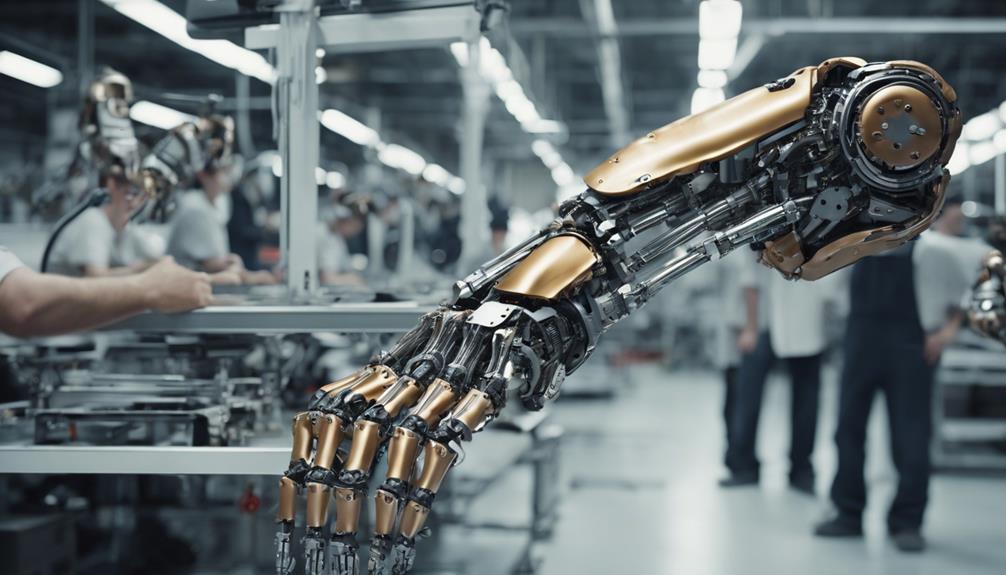As AI technologies advance, the impact on jobs is becoming increasingly evident. The substantial potential of automation to transform the workforce raises important questions about the future of employment and the skills needed to thrive in this evolving landscape.
With the looming forecast of millions of jobs being at risk of automation, understanding the nuances of how AI is reshaping industries and employment dynamics has never been more crucial.
The interplay between human workers and artificial intelligence is a complex terrain that requires careful consideration, adaptation, and strategic planning to ensure a harmonious coexistence in the workplace.
Key Takeaways
- AI will replace 85 million jobs by 2025, impacting 9.1% globally.
- New job roles like machine learning engineers will emerge.
- Jobs requiring emotional intelligence and creativity are AI-resistant.
- Adapting skills through training is vital for navigating AI's influence on the job market.
Impact of AI on Job Market
The proliferation of artificial intelligence (AI) is fundamentally reshaping the job market landscape, heralding a new era of automation and transformation across various industries worldwide. The impact of AI on the job market is profound, as highlighted in the Future of Jobs Report, with AI projected to replace 85 million jobs globally by 2025. This shift in the workforce is not limited to a few sectors but extends to industries like healthcare, agriculture, and industrial sectors.
As AI targets around 300 million jobs globally, approximately 9.1% of all jobs are at risk, with an estimated 75 million jobs expected to be automated by 2022. The changing landscape necessitates workers to acquire new skills, as indicated by the report that 54% of employees will require significant re-skilling by 2022.
Despite concerns about job displacement, AI is also set to create 133 million new roles by the same year, showcasing a transition where tasks are shifted, and new job opportunities are created in tandem with the advancement of artificial intelligence and machine learning technologies.
Jobs Replaced by AI

With the rapid advancement of artificial intelligence (AI), numerous occupations are poised to be supplanted by automation, revolutionizing the traditional job landscape.
- Customer Service Representatives: AI-driven chatbots are increasingly handling customer inquiries, reducing the need for human intervention in customer service roles.
- Autonomous Vehicles: The rise of autonomous vehicles is diminishing the demand for human car and truck drivers, potentially leading to job displacement in the transportation industry.
- Computer Programmers: AI tools like ChatGPT have the potential to automate coding tasks, impacting the roles of computer programmers who may face challenges due to increasing automation in software development.
As AI continues to evolve, industries will witness significant changes in job requirements and skill sets. Understanding the roles that AI is likely to replace can help individuals prepare for the future world of work where human-machine collaboration is essential for success.
Jobs AI Won't Replace
In light of the limitations AI faces in replicating complex human interactions and creative endeavors, certain professions remain resilient to automation, safeguarding roles that demand uniquely human qualities. Jobs requiring high levels of emotional intelligence, soft skills, and a human touch are essential components that AI struggles to replicate effectively.
Occupations such as teachers, nurses, therapists, and tradespeople fall into this category, where the skills needed go beyond technical knowledge and require a deep understanding of human behavior and emotions. Additionally, roles that involve creativity, like writers and artists, are less likely to be replaced by AI due to the unique innovative capabilities that humans possess.
While AI can enhance certain aspects of these professions, the core elements that rely on emotional intelligence and human intuition are challenging for AI to emulate. As technology advances, new jobs that combine the strengths of both humans and AI are likely to emerge, emphasizing the irreplaceable value of human-centric skills in the workforce.
Benefits of AI in Workplace

Enhancing workplace productivity and efficiency, AI technology revolutionizes traditional job roles and introduces new opportunities for skill development and growth. AI saves time on routine tasks like data entry, allowing employees to focus on more strategic and creative endeavors.
The demand for workers with AI skills is increasing, opening up avenues for individuals to upskill and stay relevant in the evolving job market influenced by AI. High school and college graduates are now seeking roles in AI-related fields, recognizing the potential for career advancement and innovation in these areas.
Human workers play a critical role in using AI effectively, training, maintaining, and monitoring AI systems to ensure optimal performance and ethical standards are met. As AI continues to advance, new job roles like machine learning engineers and AI ethics specialists are being created, transforming the workplace and offering opportunities for personal and professional growth.
Preparing for AI in the Workplace
As AI technology continues to reshape traditional job roles and create new opportunities for skill development, preparing for its integration into the workplace becomes imperative for professionals seeking to thrive in the evolving job market. The workforce must adapt to the changing landscape influenced by automation and AI integration. To succeed in this environment, individuals need to focus on developing relevant skills and undergoing targeted training programs that align with the demands of the future job market.
| Skills | AI | Jobs |
|---|---|---|
| Training | Workplace | Automation |
| Technology | Adaptation | Workforce |
Businesses are rapidly moving towards adopting AI technologies, with the majority recognizing its essential nature for success. McKinsey Global Institute forecasts a substantial contribution of $13 trillion to global economic activity by 2030 due to AI. To stay competitive, around 70% of companies are expected to embrace AI technologies by the same year. Real training and skill development are crucial for individuals to navigate the evolving workplace shaped by AI. Institutions like Nexford University are offering specialized AI programs to aid professionals in this transition.
Frequently Asked Questions
How AI Is Replacing Jobs?
AI is replacing jobs by automating repetitive tasks and data analysis, impacting roles like customer service representatives, drivers, programmers, analysts, and paralegals. Professionals in fields requiring complex tasks and human interaction are less susceptible to automation.
Which Jobs Will Be Taken Over by Ai?
AI is poised to automate tasks traditionally performed by customer service representatives, car and truck drivers, computer programmers, research analysts, and paralegals. As technology advances, roles requiring repetitive tasks and data processing are at risk of being replaced by AI.
Will Artificial Intelligence Take Over My Job?
Artificial intelligence presents a transformative force in the workforce, impacting varied professions. While some roles face automation, jobs requiring intricate human interactions and specialized skills are less susceptible. Adaptation and upskilling are crucial for navigating this evolving landscape.
How AI Is Changing the Job Market?
Innovations in AI are reshaping the job market, creating both challenges and opportunities for professionals. Adapting to this transformative landscape requires strategic upskilling and a visionary approach to harness the potential of new roles emerging.
Conclusion
In the ever-evolving landscape of automation, the rise of AI in the job market symbolizes a transformative era where adaptation and innovation are key.
Just as a seedling must adjust to changing seasons to thrive, individuals and industries must embrace upskilling and redefining roles to harness the benefits of AI.
By understanding the impact of automation and preparing for the future of work, we can cultivate a workforce that flourishes in the face of technological advancements.
Ava combines her extensive experience in the press industry with a profound understanding of artificial intelligence to deliver news stories that are not only timely but also deeply informed by the technological undercurrents shaping our world. Her keen eye for the societal impacts of AI innovations enables Press Report to provide nuanced coverage of technology-related developments, highlighting their broader implications for readers.










